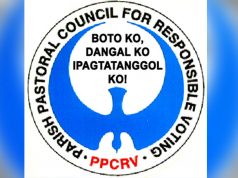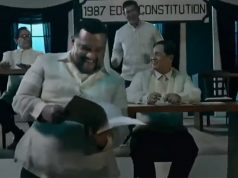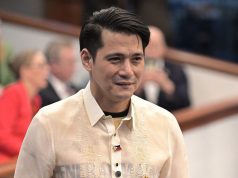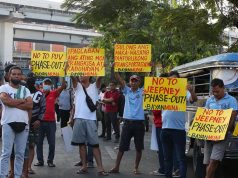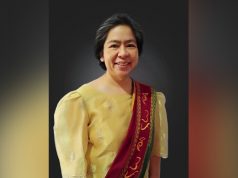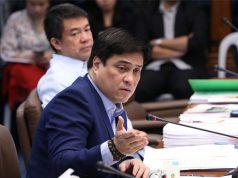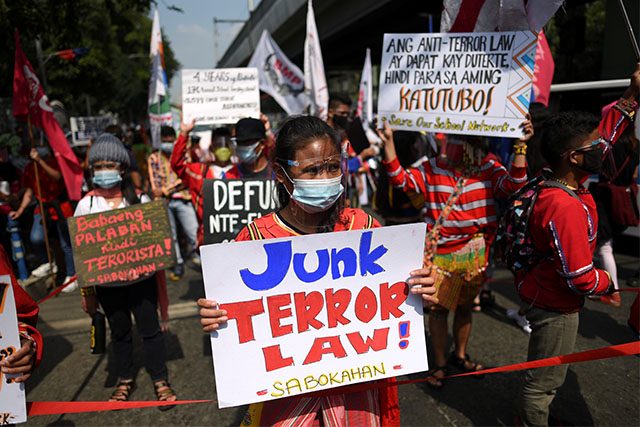
Calls to junk the Anti-Terrorism Act of 2020 (ATA) were renewed after the Supreme Court began its much-awaited oral arguments for the 37 petitions challenging the law’s supposed unconstitutional provisions on Tuesday.
The hashtag “#JunkTerrorLaw,” which has been consistently trending on local Twitter since its passage, once again gained traction as the high court began to hear petitioners seeking to nullify the anti-terror law.
Seven lawyers chosen by the petitioners are facing Solicitor General Jose Calida who has unsuccessfully pleaded to cancel the hearings before.
Among those representing the petitioners and challenging ATA are former Solicitor General Jose Anselmo Cadiz, Albay Rep. Edcel Lagman and former Bayan Muna Rep. Neri Colmenares. They are also joined by veteran rights lawyer Chel Diokno.
Petitioners earlier cited that ATA violates the protected freedoms of the Filipino people and its vague and overboard provisions that are prone to abuse.
The anti-terror law, otherwise known as Republic Act 11479, was signed by President Rodrigo Duterte on July 3 despite broad opposition against the bill.
READ: Public clamor to declare anti-terror law ‘unconstitutional’ launched after Duterte approves bill
Law and civic organizations, activists and experts have expressed strong opposition against the law which is feared to potentially stifle dissent and curtail constitutionally-protected civil liberties.
Some of its controversial provisions include the legalization of wiretapping, granting warrantless arrests without redress of grievances, being detained for up to 24 days without charges. Some critics have previously argued that it has a vague definition of terrorism.
Critics said that while the anti-terror law does not stop people from dissenting or criticizing the government “in essence,” it only applies if those activities “are not intended to cause death or serious physical harm to a person, to endanger a person’s life, or to create a serious risk to public safety.”
Framers of the 1987 Philippine Constitution, the highest law of the land, have also lodged a petition calling on the SC to declare some of the law’s bill as unconstitutional for putting at risk the rights of the people.
The oral arguments on the petitions against anti-terror law commenced on the same day the Constitution was ratified 34 years ago.
‘Uphold the Constitution’
Some Filipinos hoped the Constitution’s anniversary would bolster the high tribunal to let “liberty” prevail as the magistrates hear the arguments of the law’s challengers.
“Today is Constitution Day as well the oral arguments for the Anti-Terror Law of 2020. Sounds amazing right? The oral arguments for the ATA is today—the constitution day. May the liberty of all men prevail. #JunkTerrorLaw,” a Twitter user calling himself a debater commented.
“Uphold the Constitution! Uphold the guaranteed rights of the Filipino people to free speech, association and privacy of communication! #JUNKTERRORLAW,” another online user wrote.
“It’s a big day today for the Constitution #JunkTerrorLaw,” commented a different Filipino with a fist and a balance scale emoji.
Scale is universally known as the symbol of justice.
“On the birthday of the 1987 Constitution, oral arguments for Anti-Terror Law is taking place, and the House Committee approved the resolution for Charter Change. What a day for Philippine democracy. May justice and the best interest of the Filipino people prevail. #JunkTerrorLaw,” a law student wrote.
The 1987 Philippine Constitution is the supreme law of the republic. It was ratified by a nationwide plebiscite on Feb. 2, 1987, which is marked as the Constitution Day.
It was initiated after the country broke free from the Marcos dictatorship which was rife with human rights violations and curtailment of civil liberties.
The constitution was sought by his successor, former president Corazon Aquino, who reportedly said that the supreme law should be “truly reflective of the aspirations and ideals of the Filipino people.”




